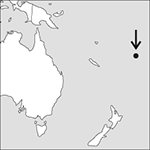
Source: MAPS IN MINUTES™ © RH Publications (1997)
Capital:
Nuku’alofa
Area:
747 sq km (288 sq miles)
Population:
106,322 (2013 est)
Currency:
1 pa’anga = 100 seniti
Religions:
Free Wesleyan 37.3%; Mormon 16.8%; Roman Catholic 15.6%; Free Church of Tonga 11.4%; Church of Tonga 7.2%
Ethnic Groups:
Tongan 96.6%
Languages:
Tongan, English (both official)
International Organizations:
UN; Commonwealth; Pacific Islands Forum; Secretariat of the Pacific Community; WTO
An island country bordering the Tonga Trench in the South Pacific Ocean.
Physical
Tonga comprises over 150 islands, most of them too small for habitation and even the largest, Tongatapu, measuring a mere 40 km (25 miles) by 16 km (10 miles). Some are coral and some volcanic, with active craters.
Economy
Tonga’s main exports are agricultural: squash, fish, vanilla beans, and root crops. However, its main sources of foreign exchange are remittances from expatriates and tourism, which is the principal industry.
History
Austronesian‐speaking peoples inhabited the islands from at least 1000 bc. By the 13th century Tongans ruled islands as far flung as Hawaii. Named the Friendly Islands by Captain James Cook, who visited them in 1773, the country was soon receiving missionaries. King George Tupou I (1845–93) unified the nation and gave it a constitution. In 1900 his son signed a treaty, making the islands a self‐governing British protectorate. During World War II Queen Sālote Tupou III (1900–65) placed the island’s resources at the disposal of the Allies; she was succeeded by her son, Taufa‘ahau Tupou IV, in 1965. In 1968 British controls were reduced, and in 1970 Tonga became independent within the Commonwealth of Nations. Tonga’s first political party was founded in 1994, with an agenda for democratic reform of the constitution. The government resisted the growing pressure for reform and there was little change before the death of Taufa‘ahau Tupou IV in 2006. His son and successor, George Tupou V, moved to relinquish much royal power. The first elections under new rules were held in 2010 and the Democratic Party of the Friendly Islands, led by long-time pro-democracy campaigner, 'Akilisi Pohiva, won twelve of the seventeen popularly elected seats. The other nine members are chosen by the nobility, one of whom, Lord Siale‘ataongo Tu‘ivakano, was elected by parliament. George Tupou V died in 2012 and was succeeded by his younger brother, Tupou VI. After the 2014 elections, 'Akilisi Pohiva became the first commoner to be Prime Minister, and launched a programme to revive the sluggish economy.
- Arminius, Jacobus (1560–1609)
- Armitage, Peter (1924– )
- Armitage–Doll model
- AR model
- armoured virus
- armouring
- arm population
- arms and armour
- arms race
- Armstrong, David Malet (1926–2014)
- Armstrong Flight Research Center
- Armstrong, Neil Alden (1930–2012)
- army
- Army Ballistic Missile Agency
- arm’s-length price
- Arnauld, Antoine (1612–94)
- Arndt–Eisert systhesis
- Arneb
- Arnhem, Battle of (September 1944)
- Arnold, Benedict (1741–1801)
- Arnsbergian
- aromatic compound
- aromaticity
- arousal
- Arowhanan